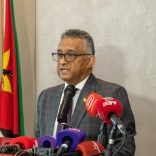Mozambique: State cuts spending, but salaries and debt continue to strain budget
Government spent over 70 billion meticais in direct awards during state of emergency – Carta

Fiile photo: DW
From April to July of this year, during which time the country was in a state of emergency, the government spent, internally, 68.22 billion meticais in the execution of 12,204 direct award processes, the report sent by President Nyusi to the Assembly of the Republic on the occasion of the end of the April 1st to July 29th State of Emergency reveals.
The report, to which ‘Carta’ has had access, also reveals that the government spent, by means of 110 direct awards processes, 3.32 billion meticais on the health sector.
The document does not provide detailed information about the goods, services and works purchased through direct awards procedures, which were resorted to because of the state of emergency.
“Despite the suspension of the issuance of certain documents required for the registration of eligible natural and legal persons to contract with the State, 1,632 public works contractors, goods suppliers and service providers were registered in the Single Registry of natural and legal persons contracting with the State, whose target group is small and medium-sized companies,” the report reads.
Within the scope of economic activities licencing, 2,824 companies with a potential 7,200 employees were licenced.
The government notes that, in order to revive the economy, it has made Value Added Tax (VAT) more flexible, as well as the payment of accounts to suppliers of goods and services to the state whose contracts are in order.
The report highlights the availability of a one billion meticais credit line, granted on concessionary terms to support cash flow and investment in micro, small and medium-sized companies.
It is noted in the report that the Administrative Tribunal issued Instruction no. 01GT / TA / 2020 of 02 April, which subjects to the regime of urgent convenience of service the administrative acts and contracts [otherwise] subject to [the general regime of] prior inspection which were signed during the State of Emergency period.
“This instruction allowed the organs and institutions of the State to continue to execute contracts for public works contracts, supply of goods and provision of services, and guaranteed an account to facilitate the accountability of funds received within the scope of Covid-19,” reads the report, which is be debated and approved by parliament tomorrow.
By Evaristo Chilingue













Leave a Reply
Be the First to Comment!
You must be logged in to post a comment.
You must be logged in to post a comment.